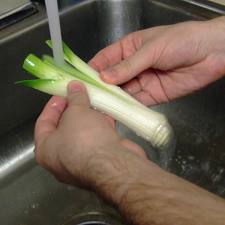I was up early, as I do, and did a long interview with Good Housekeeping that will appear … I don’t know when.
 The hygiene hypothesis came up, or that a little bit of dirt is good for you.
The hygiene hypothesis came up, or that a little bit of dirt is good for you.
I said we humans aren’t smart enough yet to know when dirt is good or bad.
The writer was in New York City, and said her friends were all going on about the microbiome – our stomach bacteria.
I said if Michael Pollan endorses the idea, I’m immediately suspect.
So after almost five years since UK health types, out of no where, announced there were 252 people sick with E. coli O157 , apparently linked to poorly washed leeks and potatoes – blame the consumer – UK types finally published a paper about the outbreak.
Between December 2010 and July 2011, 252 cases of STEC O157 PT8 stx1 + 2 infection were reported in England, Scotland and Wales. This was the largest outbreak of STEC reported in England and the second largest in the UK to date. Eighty cases were hospitalized, with two cases of hemolytic uremic syndrome and one death reported.
Routine investigative data were used to generate a hypothesis but the subsequent case-control study was inconclusive. A second, more detailed, hypothesis generation exercise identified consumption or handling of vegetables as a potential mode of transmission. A second case-control study demonstrated that cases were more likely than controls to live in households whose members handled or prepared leeks bought unwrapped [odds ratio (OR) 40, 95% confidence interval (CI) 2·08-769·4], and potatoes bought in sacks (OR 13·13, 95% CI 1·19-145·3). This appears to be the first outbreak of STEC O157 infection linked to the handling of leeks.
A large Great Britain-wide outbreak of STEC O157 phage type 8 linked to handling of raw leeks and potatoes
Epidemiology and Infection
Launders, M. E. Locking, M. Hanson, G. Willshaw, A. Charlett, R. Salmon, J. Cowden and G. K. Adak
